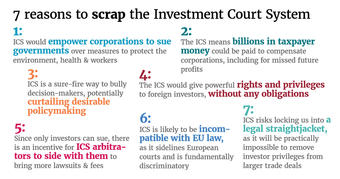7667766266
enquiry@shankarias.in
Why in news?
India and some other countries have rejected an informal proposal made by the EU and Canada to work towards a multilateral pact on investments at the World Trade Organisation that would have an Investor-State Dispute Settlement (ISDS) mechanism built into it.
What new proposal has been made?
What is the need for ISDS?

Why India rejects?
Category: Prelims and Mains | GS – II | International Relations
Source: Business Line